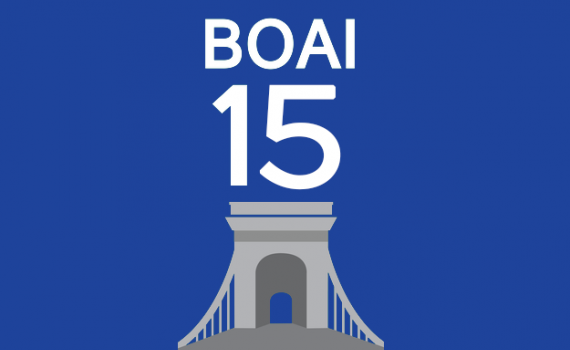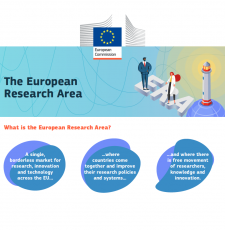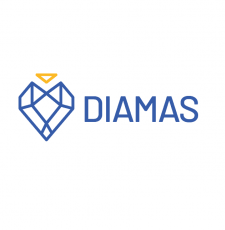
Fifteen years ago, the Budapest Open Access Initiative (BOAI) launched a worldwide campaign for open access to all new peer reviewed research. There has been a tremendous progress, but we still have work to do to achieve the BOAI vision of a world in which published research in all academic fields is freely available on the internet. To celebrate the BOAI’s 15th anniversary, EIFL Open Access Programme Manager Iryna Kuchma reflects on progress in open access, and challenges facing the open access movement.
On 14 February 2002, a group of diverse stakeholders - including EIFL - came together to accelerate progress in the international effort to make research articles in all academic fields freely available on the internet. Stakeholders represented many different points of view, academic disciplines, initiatives and countries. Together we examined strategies for serving the interests of research, researchers, and the institutions and societies that support research.
The outcomes of this meeting were far-reaching. The stakeholders committed to working together, and launched a worldwide campaign for providing OA to all peer-reviewed research. This has become known as the Budapest Open Access Initiative (BOAI).
The BOAI’s definition of OA, developed in 2002, is now internationally recognized, and is frequently used in OA policies, practices and laws:
“By ‘open access’ to [this research] literature, we mean its free availability on the public internet, permitting any users to read, download, copy, distribute, print, search, or link to the full texts of these articles, crawl them for indexing, pass them as data to software, or use them for any other lawful purpose, without financial, legal, or technical barriers other than those inseparable from gaining access to the internet itself. The only constraint on reproduction and distribution and the only role for copyright in this domain should be to give authors control over the integrity of their work and the right to be properly acknowledged and cited.”
EIFL was one of the original signatories of the BOAI, and the BOAI vision has framed and supported our work. Reciprocally, our work - and in particular the work of the EIFL Open Access Programme - takes forward the BOAI vision, and helps to overcome obstacles facing the OA movement. In Europe, and across over 60 developing and transition economy countries in the EIFL network, we work to encourage adoption of OA policies and mandates, enhance OA journals and repositories, embed OA into young researchers’ workflows and change the ways in which research is assessed and evaluated.
The BOAI’S 15th anniversary presents an opportunity to reflect on the OA movement, and on the future and value of OA.
MAINSTREAMING OA
For me, success for OA means that OA is the mainstream, the norm of scholarly communication, embedded in researchers’ workflows.
I would like to see over 80% of current research outputs available in OA. I would like every institution of higher education that offers degree courses, and every research funding agency, have an OA policy in place.
There has been progress. (opendoar.org/index.html) OpenDOAR, the Directory of Open Access Repositories, counts 3,316 open access repositories worldwide - over 900 of these are in EIFL partner countries. In the EIFL network alone, over 100 institutions have adopted OA policies, enabling immediate, unrestricted and free online access to peer-reviewed research.
We welcome European Commission (EC) leadership in passing OA policy that covers all the research funded under Horizon 2020. From 2014 - 2020, Horizon 2020 has committed nearly 80 billion EUR to research, and the policy mandates researchers to make it openly available. We are involved in the EC OpenAIRE project, and several other EC-funded projects that help to implement this policy.
GROWING THE OA MOVEMENT
The OA movement has won worldwide recognition, but there could be more involvement from key players - in national governments, in research funding agencies, in publishing companies, at educational institutions. We also need to raise awareness of the general public.
I think we still need more involvement and voices from developing and transition economy countries, where well over half of the world’s population live.
And OA should be a part of Open Government Partnership (OGP) Initiatives, as is already the case in Slovakia and in some other countries. In Slovakia, the government approved an OGP Action Plan in February 2015. The Action Plan includes OA, open data and open education policies in addition to traditional OGP open government and open justice initiatives. This approach is quite unique and I think should be replicated in other countries.
Open Data initiatives, Open Source pharmaceutical industry, patient groups and health movements, biomedical (and other) companies practising text and data mining could be the new voices enhancing OA movement.
We also need to build connections between OA and the Open Educational Resources movement, which is already happening in Poland: Coalition for Open Education.
CHALLENGES AND OVERCOMING THEM
OA is still facing many obstacles: confusion, complexity, copyright barriers, lack of trust and commitment, and lack of digital skills. These are all areas for BOAI and EIFL to continue to work on in future.
A challenge that stands out for me is increased complexity of OA debates (for example, the distinctions between green, gold and platinum with respect to self-archiving and publishing in OA journals), which may seem rather specialized, and in conflicts around OA implementation.
A particular challenge in the EIFL network of developing and transition economy countries, is Article Processing Charges (APCs), which are exorbitantly expensive, especially if they must be paid in a foreign currency.
Poor technology infrastructure and internet access continue to be obstacles to OA in many developing countries, as do language barriers in a world in which research is predominantly conducted and expressed in English.
THE BOAI’S 15TH ANNIVERSARY SURVEY - WATCH THIS SPACE
To celebrate its 15th anniversary, BOAI conducted an online, open public survey to assess progress and elicit ideas and recommendations for future campaigns and activities.
A BOAI working group, that I am a member of, will now review the responses and draft recommendations for the future of the OA movement. We’ll be sharing the BOAI’s analysis of the research results on our website - so watch this space.
In the meantime, follow the BOAI 15 twitter feed (@TheBOAI) and #TheBOAI for a series of tweets showcasing some of the reactions collected from the wider Open community on the impact of the BOAI and on OA in general.
SHARE / PRINT








